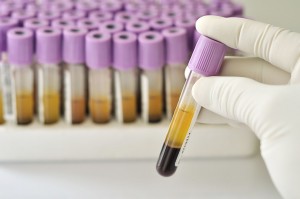New blood test can “differentiate between pancreatic cancer and chronic pancreatitis”
 A study by a biopharmaceutical company, Immunomedics has found that a new blood test using their humanised antibody, clivatuzumab can identify pancreatic cancer but that it does not react with chronic pancreatitis tissues. This is important because it has the potential to be used as a test to only pick up pancreatic cancer or potential pancreatic cancer.
A study by a biopharmaceutical company, Immunomedics has found that a new blood test using their humanised antibody, clivatuzumab can identify pancreatic cancer but that it does not react with chronic pancreatitis tissues. This is important because it has the potential to be used as a test to only pick up pancreatic cancer or potential pancreatic cancer.
The study, which was presented at the 2013 Annual Meeting of the American Association for Cancer Research in Washington DC this week, used clivatuzumab to detect levels of the PAM4 antigen in blood samples.
It was found that 64 per cent of pancreatic cancer patients with early stage disease and 85 per cent with advanced disease (spread to other organs) were found to have the PAM4 antigen detected by clivatuzumab.
In 120 patients who had been diagnosed with benign (non-cancerous) diseases of the pancreas, 24 (20%) were found to be positive for the PAM4 antigen. The majority of these cases had been diagnosed with chronic pancreatitis (which is a risk factor for pancreatic cancer) and all had had an operation to remove part of the pancreas because of the severity of their disease or because they had had the disease for a long time.
At first this number of people with benign disease being positive for the PAM4 antigen was seen to be a problem. However, previous studies have shown that PAM4 is not present in samples of normal pancreas or pancreas with a benign disease. When the researchers looked at the surgical specimens of those with the chronic pancreatitis, they found that the PAM4 was found only within pancreatic intraepitheral neoplasia lesions (PanINs -which are known to be precursors to pancreatic cancer) and not within the inflamed tissue.
This is important because these results suggest that those chronic pancreatitis patients who test positive for PAM4 (as well as other patients with currently benign diseases of the pancreas) could in fact have the pancreatic cancer precursor lesions (PanINs) and therefore should be monitored very closely.
While this is hopeful, more studies will need to be made on a wider and larger group of patients before the this test could be made routinely available.
Source: Immunomedics company press release, 8th April 2013